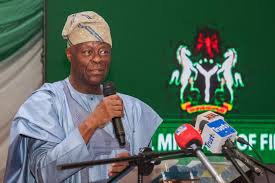The Federal Government has paid over N2 trillion owed to contractors for capital projects from the 2024 budget, and says it will now focus on ensuring timely release of funds for 2025 capital projects.
The Minister of Finance and Coordinating Minister of the Economy, Wale Edun, made this known on Thursday during a ministerial briefing in Abuja. He also declared that Nigeria is “open for business” to global investors, citing improved economic stability under President Bola Ahmed Tinubu’s administration.
“In the last quarter, we did pay contractors over N2 trillion to settle outstanding capital budget obligations from last year,” Edun said. “At the moment, we have no pending obligations that are not being processed and financed. The focus will now shift to 2025 capital releases.”
Edun stressed that government agencies must only sign contracts for projects when funds have been approved and released. “Despite appropriation, it is when funds are made available and authorised for spending that government entities should enter into binding commitments,” he explained.
He pointed to positive economic indicators such as a trade surplus of over $4 billion in the first quarter of 2025, export growth of 9.8 percent, stable exchange rates, and foreign reserves at $39 billion in July. He said these results were due to the government’s policies, which have created stable conditions for businesses to plan and invest.
The minister also highlighted reforms in public finance, including stopping the unauthorised use of Ways and Means loans from the Central Bank of Nigeria. He said this move, combined with GDP rebasing, had reduced Nigeria’s debt-to-GDP ratio from 52.1 percent to 38.8 percent. “There have been no debits to Ways and Means since early in this administration,” he stated, noting that gross revenues for the first half of 2025 were 37.4 percent higher than in the same period in 2024.
Edun explained that the Federal Government had also increased resources available to state governments by repaying old deductions from the Federation Account. This, he said, had improved their capacity to invest in capital projects. “Since the first half of 2023, the combined fiscal balance of the states has grown from 1.8 percent of GDP to 3.1 percent — from N2.8 trillion to N7.1 trillion. This improvement is linked to subsidy removal and adherence to the rule of law,” he said.
He announced that Nigeria’s most comprehensive tax reform will take effect in January 2026. The reform will combine all tax laws into one framework, remove more than 50 overlapping taxes, and make it easier for businesses to comply.
The minister also introduced a new revenue optimisation and assurance platform that will use technology, digitisation, and artificial intelligence to centralise collections from ministries, departments, and agencies. The platform will help block leakages, improve financial monitoring, and strengthen revenue intelligence.
Edun reaffirmed the government’s target to grow the economy by 7 percent annually in the medium term. He said this growth would be driven by investments in agriculture, education, health, manufacturing, technology, and infrastructure. He cited recent efforts to attract private investment into infrastructure, including plans to upgrade the Third Mainland Bridge and Carter Bridge in Lagos through public-private partnerships.
On the energy sector, Edun said the government aimed to raise power generation to 6,000 megawatts before the end of 2025 and complete the Ajaokuta-Kaduna-Kano gas pipeline to support industrial growth.
He also gave updates on social welfare programmes, stating that direct cash transfers to vulnerable Nigerians were ongoing. According to him, eight million out of the 15 million targeted beneficiaries had received payments in three rounds. He added that the payments were fully transparent, with biometric verification and digital disbursement.
Other ongoing initiatives include the Nigeria Education Loan Fund, the Consumer Credit Scheme, the planned Youth Investment Bank, and a €600 million facility for the digital and creative industries, with a special focus on young women.
“Our commitment is to build an economy that works for everyone with transparency, resilience, and purpose,” Edun said.
